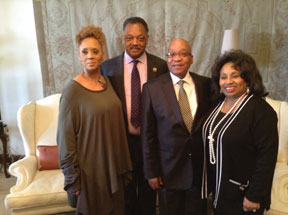

Jesse Jackson’s ties to Africa pay off
Santita, daughter of Jessie Jackson, Sr., wife, Jacqueline; meet with South Africa President Jacob Zuma. (Photos by George E. Curry/NNPA)
By George E. Curry
PRETORIA, South Africa (NNPA) – When South Africa President Jacob Zuma recently presented Jesse Jackson with the Companions of O.R. Tambo Award – the highest honor a non-citizen of the country can receive – he cited the human rights icon’s “excellent contribution to the fight against apartheid.”
While it represented a personal honor for Jackson, it symbolized the understated – and often underappreciated –role Jesse Jackson and other African Americans have played in bringing minority-ruled White South Africa to its knees.
Over the years, Jackson has been a free-wheeling, self-appointed ambassador without portfolio, the recipient of diplomatic courtesies by numerous heads of state yet not being saddled with the restrictions and myopic focus of U.S. diplomats who take their marching orders from Washington. He is often afforded diplomatic courtesies and his presence usually lead to front-page stories.
Jackson’s first major encounter with Africa was in 1979 after the death of anti-apartheid activist Steve Biko. A student leader and founder of the Black Consciousness Movement, Biko was arrested at a roadblock in Port Elizabeth on August 18, 1977 and taken in custody under the country’s Terrorism Act. He was tortured and beaten during a 22-hour interrogation and died from a brain hemorrhage as a result of repeated injuries to the head. More than 10,000 people at-tended his funeral. The movie, “Cry Freedom!” was based on his life.
“Jackson first visited South Africa in 1979 following the death of Steve Biko,” the awards program recounts. “He attracted huge crowds at his rallies in Soweto, where he denounced South Africa’s oppressive system of apartheid.”
Back home, Jackson supported the Free South Africa Movement started by Randall Robinson, executive director of TransAfrica, and Mary Frances Berry, a member and later chair of the U.S. Commission on Civil Rights.
The United States’ official policy was to maintain its relationship with South Africa, arguing that “constructive engagement” would be more effective in tearing down the walls of apartheid than direct confrontation. But the Free South Africa Movement had other ideas, staging daily protests in front of the South African Embassy in Washington and finally getting Congress to enact sanctions under the Comprehensive Anti-Apartheid Act.
College students led corporate and campus disinvestment campaigns and before long, European countries followed the U.S. lead and in 1994, Nelson Mandela was elected the country’s first Black president.
In an uncanny sense of timing, Jackson was in South Africa on Feb. 11, 1990 when Nelson Mandela walked out of prison after 27 years of confinement. Jackson met with Mandela in South Africa last year and wanted to see him again two weeks ago, but arrangements could not be completed within the short window the human rights leader was in southern Africa. That ended up working to Jackson’s advantage.
An ailing Mandela is believed to be in extremely poor health. And when President Jacob Zuma, an old ANC colleague, visited Mandela at home, it was widely viewed as an exploitive photo opportunity. The backlash was fierce, both in South Africa and abroad, as footage of a distant, unsmiling Mandela was beamed around the world.
In a meeting with Virginia E. Palmer, the Chargé d’Affaires at the U.S. Embassy in Pretoria, Jesse Jackson reminded her of how the U.S. government had been on the wrong side of history in South Africa. Because of the determination of its citizens, however, the U.S. changed its policy and supported majority rule.
“You can say that,” Palmer told Jackson.
Jackson can say a lot of things directly to African leaders, many of whom studied in the United States and have a deep respect for Jackson and the Civil Rights Movement.
“There’s an appreciation of our work here that is significant,” Jackson said in an interview in Johannesburg. “They identify us with the liberation movement, the anti-apartheid movement, the anti-colonialism movement. I know most of the leaders. There’s a trust and bond there because we have worked here.”
Last September, that trust and bond led to Yahya Janneh, president of The Gambia, to turn over two Gambian dissidents to Jesse Jackson. Amadou Scatred Janneh and Tamsir Jassen, who hold dual U.S.-Gambia citizenship, were set free as a result of a direct appeal from Jackson.
Of course, it wasn’t the first time the human rights activist had brought prisoners home. He performed similar feats in Syria, Iraq, Yugoslavia, Liberia and Cuba.
Sometimes Jackson’s accomplishments in Africa are less dramatic, but important nonetheless.
Newly-elected Kenya President Uhuru Kenyatta and his chief rival, Raila Odinga, had not spoken since their divisive election on March 4. After meeting separately with each man, Jackson encouraged them to meet, put the election behind them, and come together for the sake of the country.
The Standard, a newspaper in Kenya, reported, “…Inquiries within the President’s and Raila’s side revealed that the influential force bringing the two hitherto bitter rivals together was America’s civil rights and towering religious figure, the Reverend Jesse Jackson.”
Jackson concedes that his next mission – trying to narrow the economic gap between whites and Blacks in Africa – may be his most difficult one.
He said, “What we see increasingly is that Africans are free, but not equal.”


Be the first to comment